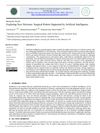 August 2024 in “International Journal of Dermatology”
August 2024 in “International Journal of Dermatology” Exosomes show promise for treating hair loss and need more research.

The trial aims to understand how obesity and lifestyle affect circadian rhythms in people with schizophrenia and bipolar disorder.
Curcuma aeruginosa Roxb. may help treat hair loss by affecting specific biological pathways.
 July 2024 in “Research Square (Research Square)”
July 2024 in “Research Square (Research Square)” SIRT3 and SIRT7 decrease, while NFATC1 and PDL-1 increase in Androgenetic Alopecia.
 June 2024 in “CRC Press eBooks”
June 2024 in “CRC Press eBooks” Calcium is essential for plant root growth and function.
 June 2024 in “British Journal of Dermatology”
June 2024 in “British Journal of Dermatology” The grand round helps improve diagnoses and suggests new treatments for hair disorders.
 June 2024 in “Sohag Medical Journal”
June 2024 in “Sohag Medical Journal” Vitamin D is linked to hair health, but more research is needed for its use in treating female hair loss.
 May 2024 in “Journal of drug delivery science and technology”
May 2024 in “Journal of drug delivery science and technology” Exosomes show promise for treating skin diseases and improving skin regeneration.
 March 2024 in “Ukraïnsʹkij žurnal dermatologìï, venerologìï, kosmetologìï”
March 2024 in “Ukraïnsʹkij žurnal dermatologìï, venerologìï, kosmetologìï” Topical retinoids are important for treating acne effectively and safely.
 January 2024 in “Frontiers in plant science”
January 2024 in “Frontiers in plant science” The zinc finger protein 3 in Arabidopsis thaliana reduces plant growth and root hair development.
 January 2024 in “Journal of the American Academy of Dermatology”
January 2024 in “Journal of the American Academy of Dermatology” The document concludes that more research is needed to confirm if COVID-19 vaccines cause a type of hair loss called alopecia areata.

UC-MSC-derived exosomes may help treat hair loss by promoting hair cell growth through AKT activation.
 December 2023 in “Sains Malaysiana”
December 2023 in “Sains Malaysiana” The enzyme Rand protease works well for leather dehairing and its stability is important, with Leu75 playing a key role.
 November 2023 in “Brain Sciences”
November 2023 in “Brain Sciences” Some medications might contribute to male infertility, with finasteride showing a high number of reports.
 November 2023 in “Curēus”
November 2023 in “Curēus” Melatonin may help manage PCOS by improving insulin sensitivity, hormone balance, and mood.
 October 2023 in “Frontiers in endocrinology”
October 2023 in “Frontiers in endocrinology” Androgens and androgen receptors are important for metabolic health, affecting how the body uses glucose and fats through mitochondrial function.
 October 2023 in “Clinical medicine and medical research”
October 2023 in “Clinical medicine and medical research” Thyroid function may influence hair loss after COVID-19.
 September 2023 in “The FASEB journal”
September 2023 in “The FASEB journal” Foxn1 is important for fat development, metabolism, and wound healing in skin.
 September 2023 in “Medical lasers”
September 2023 in “Medical lasers” The botanical shampoo with Morus alba root extract is safe and effective for treating hair loss.
 August 2023 in “Innovare journal of Ayurvedic sciences”
August 2023 in “Innovare journal of Ayurvedic sciences” Mango and hibiscus leaf extracts could help manage diabetes by inhibiting enzymes related to the disease.

AI-assisted surgical robots improve surgery precision and safety.
 June 2023 in “Frontiers in Genetics”
June 2023 in “Frontiers in Genetics” Genes related to calcium signaling and lipid metabolism are important for curly hair in Mangalitza pigs.
 June 2023 in “Plastic and Reconstructive Surgery – Global Open”
June 2023 in “Plastic and Reconstructive Surgery – Global Open” Exosomes may improve skin, scars, hair growth, and fat grafts in plastic surgery, but more research is needed.
 May 2023 in “bioRxiv (Cold Spring Harbor Laboratory)”
May 2023 in “bioRxiv (Cold Spring Harbor Laboratory)” Cannabidivarin (CBDV) helps new brain cells grow and develop in a specific brain area through a certain receptor.
 April 2023 in “Journal of Investigative Dermatology”
April 2023 in “Journal of Investigative Dermatology” The mTOR signaling pathway might play a role in radiation dermatitis, but more research is needed.
 April 2023 in “The journal of investigative dermatology/Journal of investigative dermatology”
April 2023 in “The journal of investigative dermatology/Journal of investigative dermatology” A specific group of early-stage melanocytes is reduced in vitiligo-affected skin, which may explain treatment resistance.
 April 2023 in “Journal of Investigative Dermatology”
April 2023 in “Journal of Investigative Dermatology” Mitochondrial dysfunction contributes to skin aging and hair loss.
April 2023 in “The journal of investigative dermatology/Journal of investigative dermatology” MEF2C is crucial for normal hair cycle progression.
 April 2023 in “Journal of Investigative Dermatology”
April 2023 in “Journal of Investigative Dermatology” Krox20 (Egr2) is important for the function of epithelial stem cells.
 March 2023 in “World Journal of Biology Pharmacy and Health Sciences”
March 2023 in “World Journal of Biology Pharmacy and Health Sciences” Low levels of zinc and ferritin may be linked to the severity of alopecia areata in Iraqi patients.




























